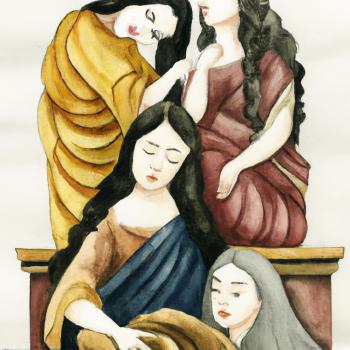Our neighbor, Amy, was about this age the day I stopped outside her house, with several small children in tow, to say hello to the family dog. Amy's mother was in the front yard, watering the columbines in her flowerbed. As I called a hello she looked up with a grim half-smile that took me aback. After a couple minutes of small talk I asked if there was anything wrong. She hesitated, as if she wanted to speak but wasn't sure if she should.
"It's Amy," she finally said, not quite looking me in the eye. "She's involved with this boy and I don't think it's good for her." When I asked her why, she sighed. "Her whole life revolves around him. They work at the same fast-food place, and I don't know if he'll even finish high school." She paused. "I'm worried that there might be . . . issues." She glanced at the ground, and I thought about how painful this must be for her, the Young Women's president in our ward and the mother of three older children who were unqualified success stories. She was a prime candidate for blaming herself for her daughter's trouble, which would itself be a serious problem.
"Did Amy seem happy before she met this guy?" I asked.
Her mother shook her head slowly. "I've been worried about her for a while. I wondered if maybe she just needed some extra love. That's why we got Rusty," she said, motioning to the manic retriever my preschoolers were trying to pet through the chain-link fence. "It's supposed to be Amy's dog. She hasn't shown much interest, though."
Now it was my turn to hesitate. A question welled in my throat, one that my neighbor might balk at. I asked it anyway. "Would you say Amy has power in her life?"
She looked uneasy, and I didn't blame her. Power is not a commodity we associate with Mormon girls and women. To our ears the very concept of power sounds worldly and corrupt, unless we're talking about priesthood power, which we qualify as exclusively masculine. But I wasn't talking about priesthood power, and I wasn't talking about the steel-fisted power of a political dictator or corporate mogul, either.
I tried to explain. "What I mean is, does Amy sense that she's in control of her own life? That she has the right and the ability and the opportunity to get what she wants and what she needs?"
Amy's mom grew thoughtful. "Probably not," she finally said. "I never even considered that might be a factor." She was quiet for another moment, and then suddenly looked me in the eye. "How did you know?"
I replied, "Because I remember."
All the sixth graders in my school district went to Outdoor Education camp for a week in the fall. There were separate cabins for boys and girls, but our daytime activity groups were mixed. Luckily Bill Polizos, the boy I'd pined for since 4th grade, was in my group. Unluckily, so was Mr. Lee, our school's gym teacher who didn't like me and didn't hesitate to tell me so. I was immature, he said, and he was right -- socially and physically I was nothing but awkward. Because of his dislike for me, Mr. Lee's gym class was doubly humiliating, especially the gymnastics unit. The other girls would execute graceful backbends and roundoffs on the floor mats, but no matter how many times Mr. Lee shouted instructions, I couldn't even turn a cartwheel. When it was my turn for the vault, he would reluctantly step close to the springboard to spot me, and as I forced myself to run to him his face would harden with distaste.
The last night of Outdoor Ed there was a dance, the first boy-girl social event for most of us. My cabin mates convinced our two teenage counselors to let us try on their makeup, and at one point someone handed me a thick tube of black mascara. I applied several layers to my eyelashes before heading to the main cabin for the dance. I was standing with some friends, trying to look relaxed and nonchalant, when I heard Mr. Lee telling stupid jokes to some other kids behind me. I turned around to roll my eyes, and found myself face to face with him.
He glanced at me, did a double take and took a step backward. "Whoa," he said, and stared at me with open admiration. "You, um . . . you look different tonight."
I turned back around, not knowing how to respond. Mr. Lee's sudden approval seemed kind of creepy. But even so, I was strangely exhilarated. Something important had just happened: the balance of power in our relationship seemed to have shifted in my favor. Apparently that mascara had revealed in me something he liked, something he wanted. And I sensed that desire granted me leverage, like the leverage I used to have with my mother -- the gravity to bend life in the direction I wanted, and hold others in my orbit.
This power had secured my universe as a preschooler, although once I hit kindergarten its force began to wane. Despite my most concentrated efforts, I failed to keep my father from leaving. I failed to keep my mother's attention and loyalty once she remarried. At that point it was my stepfather's will that counted anyway, and with him my little-girl tactics backfired miserably. But just now, with just one glance, I'd affected Mr. Lee's mood and feelings and even behavior. I spotted Bill Polizos on the other side of the room and imagined possibilities.




